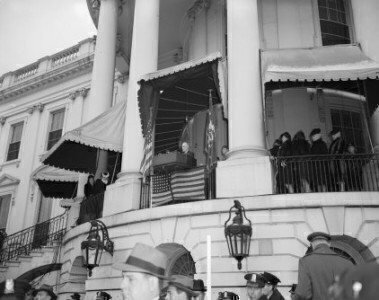The Constitution now sets January 20th as inauguration day every four years, but it was 72 years ago today that a historical first – and last occurred: The inauguration of a U.S. President to a fourth term in office.
 Originally, presidential terms started on March 4 under the Constitution, with the public ceremony moved to the next day if a term started on a Sunday. But in 1933, the enactment of the 20th Amendment moved inauguration day to January 20. (Since then, three ceremonies were held on January 21 after a presidential term started on a Sunday.)
Originally, presidential terms started on March 4 under the Constitution, with the public ceremony moved to the next day if a term started on a Sunday. But in 1933, the enactment of the 20th Amendment moved inauguration day to January 20. (Since then, three ceremonies were held on January 21 after a presidential term started on a Sunday.)
Franklin Roosevelt was the first president to have an inaugural ceremony under the 20th Amendment, and his final inauguration was likely the last of its kind, due to the ratification of the 22nd Amendment in 1951, which limited a President to serving two terms and a maximum of 10 years in office.
On January 20, 1945, President Roosevelt was starting his fourth term in office and his 13th year in the White House.
The only fourth-term inaugural was unusual for several reasons beyond Roosevelt’s longevity as President. Wartime conditions had eliminated the usual parade as an option because of gasoline rationing. And security concerns (and a general sense of wartime austerity) led to the ceremony being moved from the Capitol to the White House’s South Portico.
Still, a crowd gathered on the White House’s snowy lawn at 12 p.m. to see Roosevelt and his new Vice President, Harry Truman, take their oaths of office.
President Roosevelt’s inaugural address was unusually short, the second shortest in the history of such speeches, at 550 words.
The President talked about the need for the American people to work together after global peace had been achieved, and he saw the changes that were coming socially in the United States.
“Our Constitution of 1787 was not a perfect instrument; it is not perfect yet. But it provided a firm base upon which all manner of men, of all races and colors and creeds, could build our solid structure of democracy,” he said.
By 1 p.m., the President and the First Lady, Eleanor Roosevelt, were hosting a buffet lunch for friends.
“The ceremonies were short—shorter than ever before, I think—but very solemn and impressive,” Eleanor Roosevelt wrote in her syndicated newspaper column.
Three months later, President Roosevelt passed away at the age of 63.






